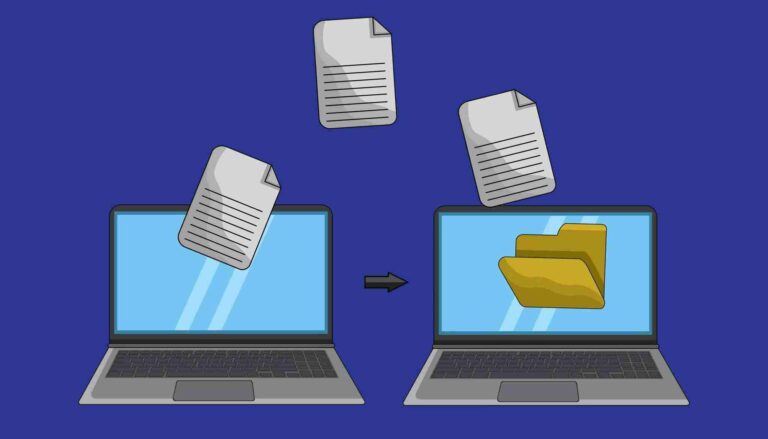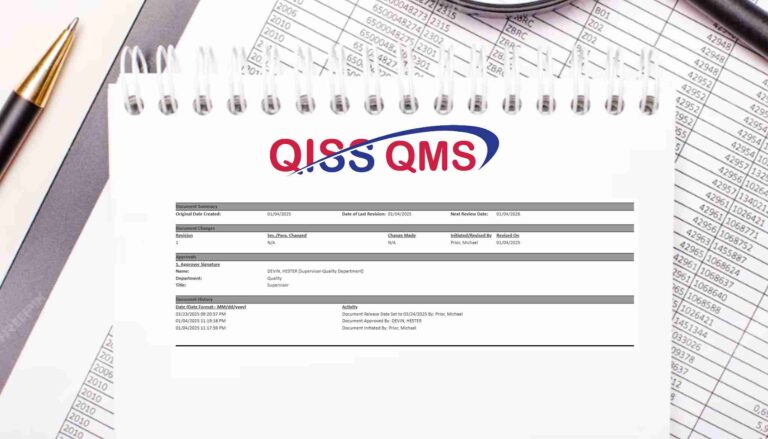Quality Control Management Software
Many organizations struggle with quality management challenges like inefficient document handling, limited data visibility, and risk management. At QISS, we recognize these frustrations and offer our Quality Management Software designed to meet your needs. With tailored modules that simplify daily tasks, QISS QMS not only helps you maintain compliance with standards like ISO 9001 but also improves your overall operational efficiency. Let us help you achieve a smoother quality management experience—your success is our success.
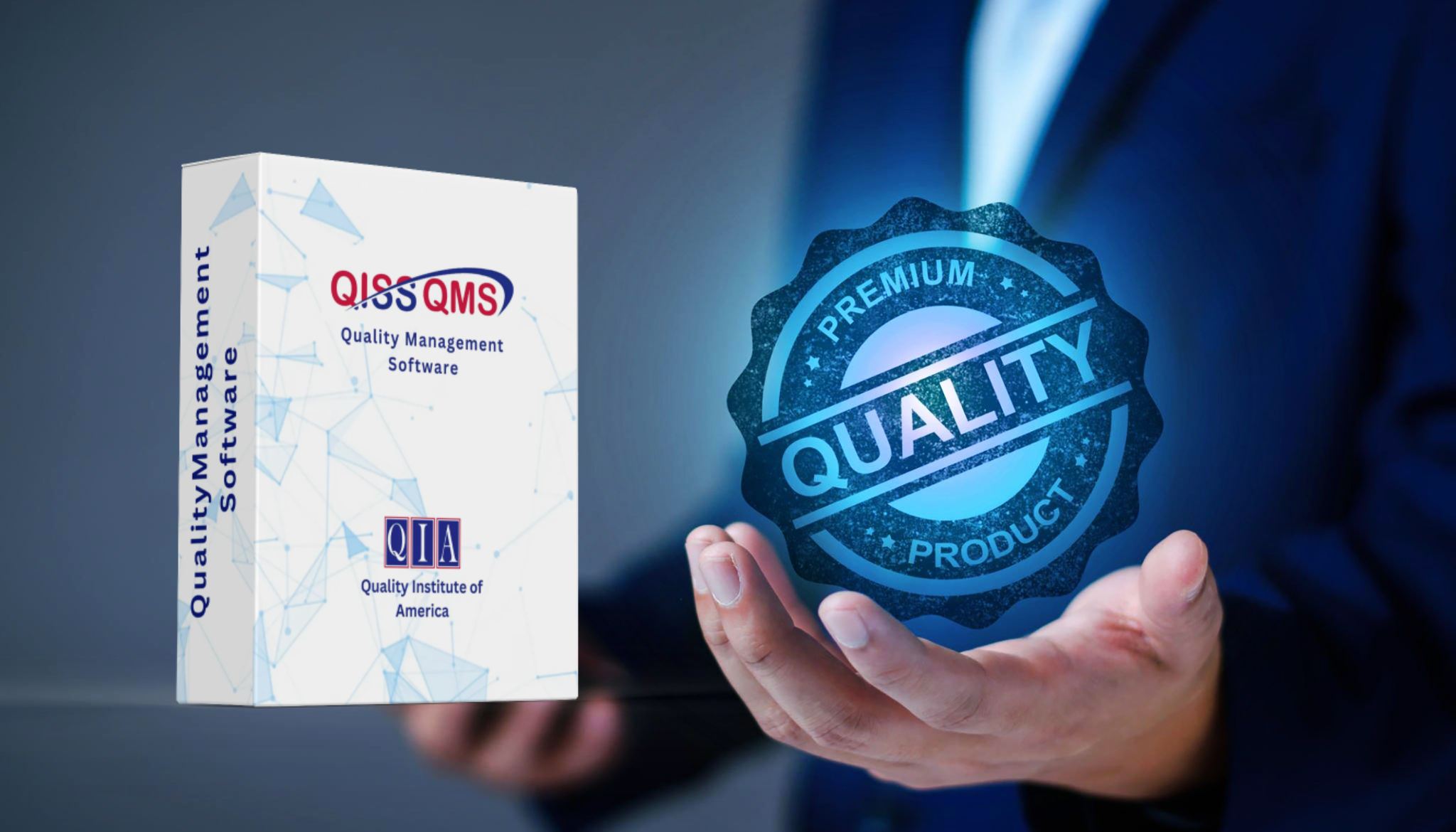
Our Software Rating
Solve Common Quality Management Challenges
Streamline your processes, manage compliance and drive continuous improvement with our QMS software.
Document Handling
Inefficient document handling is a common challenge for organizations, leading to frustrating version control issues and misplaced files. Searching for essential documents can be a hassle, especially when outdated versions surface. Quality control management software addresses this by automating document control and centralizing all documentation. This ensures access to the latest versions, simplifies the review and approval process, and significantly reduces errors. Ultimately, QISS QMS provides peace of mind, allowing your team to focus on what truly matters.


Real-Time Reporting
Limited real-time data visibility can significantly hold back organizations by slowing down decision-making and making it difficult to identify emerging quality issues. Our QISS Quality Management Software provides real-time dashboards and reporting tools that enable teams to monitor key quality metrics effortlessly. This improved visibility supports proactive management of quality issues, allowing for timely corrective actions that keep operations running smoothly and efficiently.
Compliance Challenges
Dealing with compliance challenges can be overwhelming for many organizations, especially when trying to keep up with industry standards and regulations. Without effective management, this can lead to costly penalties. QISS QMS makes compliance management easy by automating key workflows and providing robust audit management tools. Our quality management software ensures alignment with standards like ISO 9001, preparing you for audits and minimizing non-compliance risk. This proactive approach allows you to focus on your core operations with confidence.


Risk Management
Ineffective risk management poses a significant challenge for organizations, often leading to reactive responses rather than proactive solutions. This frustration comes from scrambling to address issues after they arise instead of preventing them. Our QISS QMS Software has built-in risk management features that help organizations systematically identify, assess, and prioritize risks. By establishing a structured approach to risk management, businesses can implement preventive measures that tackle current challenges and promote continuous improvement in their quality processes.
QISS QMS Software for Quality Assurance Managers
Research shows that QMS software can help quality managers reduce costs associated with non-compliance, rework, and wastage, enhancing management systems and fostering a culture of continuous improvement for better project outcomes.
What QISS QMS Can Do?
Upgrade your quality management system by incorporating advanced capabilities.

Document Control
Ensure all quality management documents are current, accessible, and properly managed to support compliance.

CAPA Management
Use QISS QMS to identify issues, implement solutions, and prevent future occurrences to ensure continuous improvement.

Non-Conformance
Identify non-conformance issues, analyze their root causes and take actions to improve processes and prevent recurrence
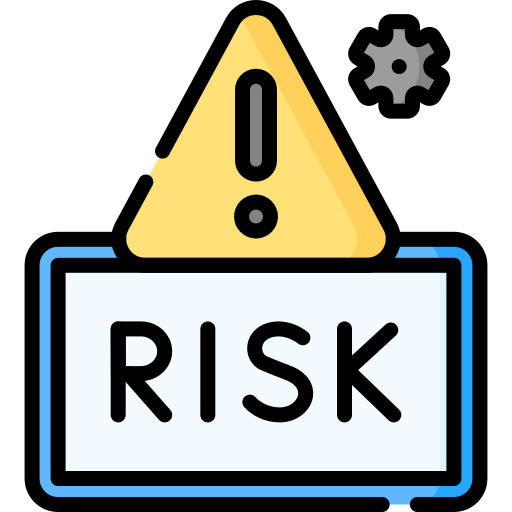
Risk Management
Identify potential risks, assess their impact, and implement strategies to mitigate them effectively with our QMS software.
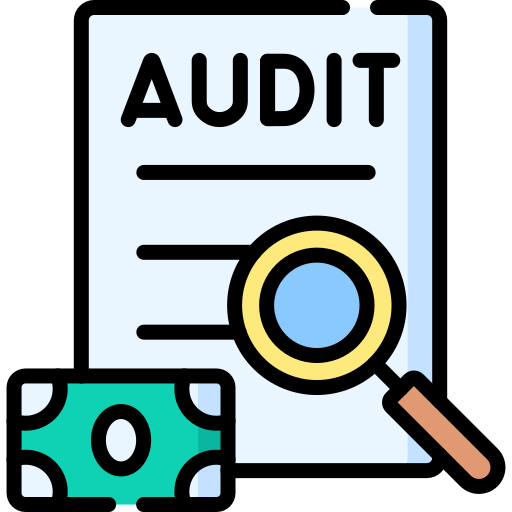
Audit Management
With QISS QMS, you can plan, execute, and analyze audits to support compliance and improve quality in organizational processes.

Supplier Management
Ensures supplier quality by conducting audits, verifying certificates, and managing NCR to maintain compliance and performance.

HSE Compliance
Manage incident reports to identify root causes, reduce negative impacts, and implement corrective actions to prevent future accidents.

Calibration Management
Check the instrument’s accuracy and precision of measurements to increase product quality and reduce errors.

Training Management
Plan, deliver and evaluate training programs to improve employee skills so that they can perform their roles effectively.

Customer Complaint & Survey
Improve your product quality by addressing and resolving customer issues, leading to greater satisfaction and loyalty.

Maintenance
Manage repair of equipment, machinery, and facilities to ensure optimal performance and longevity with our QISS QMS software.

Impact Monitoring
Track performance, identify issues, and ensure continuous improvement through data analysis.
We Have a Total of 30 modules in Our QISS QMS Software
Contact our team to learn more about our management software and how it can help you maintain quality.
QISS QMS for Your Industries
A software tailored to your quality needs

Laboratory

Manufacturing
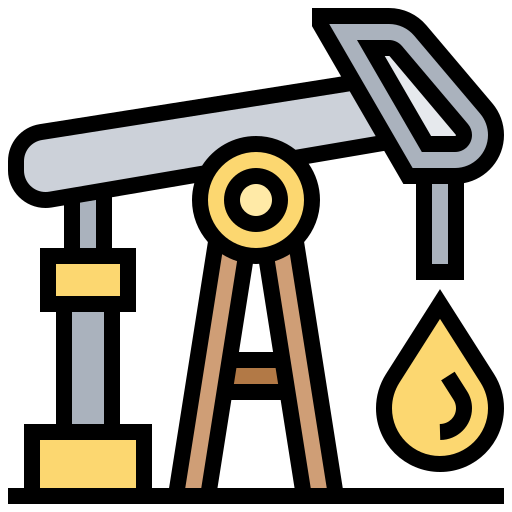
Oil & Gas

Pharmaceutical

Food

Chemical

Construction

Medical
Why Choose QISS QMS for Your Business?
When you choose our Quality Management Software, you’re not just getting a tool—you’re giving your team the chance to really excel in quality management. With over 30 years of experience, we understand how to make your workflow smoother through effective task scheduling. Our E-Signature feature keeps things secure, while our audit trail ensures every action is transparent. We’re here to support you, helping you get the most out of our software. Join our satisfied clients who trust us for their quality management needs!
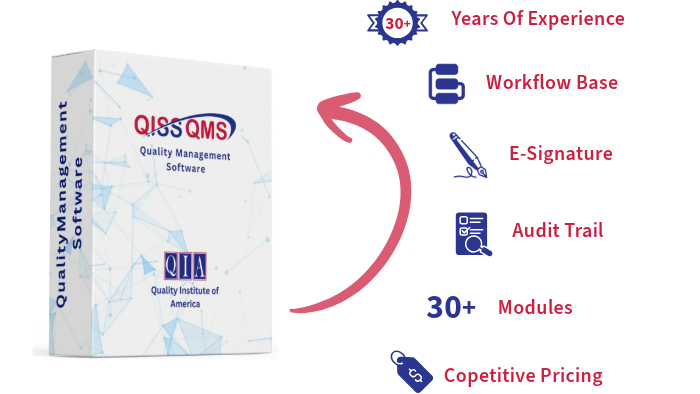
Testimonials
What Our Clients Say About Us
Our Clients













About QIA
The Quality Institute of America (QIA), located in Houston, Texas, is dedicated to enhancing client profitability through effective management systems. Our flagship product, QISS QMS software, automates Quality Management Systems to streamline processes and improve efficiency. In addition to our software solutions, we offer traditional consulting, training, and auditing services for various Management System standards. At QIA, we empower organizations to achieve higher quality standards and drive sustainable growth.

Years of Experience

ISO Trainer

ISO Consultants
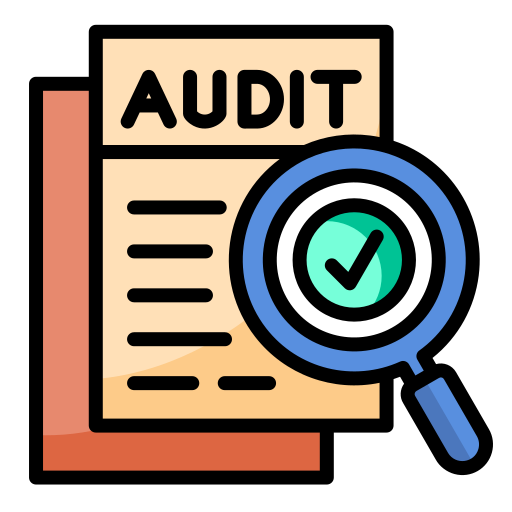
Internal ISO Auditor

Customer Support

Years of Experience

ISO Trainer

ISO Consultants

Internal ISO Auditor

Customer Support
Automate Your Management Process
Speed up your management process with our QISS software.
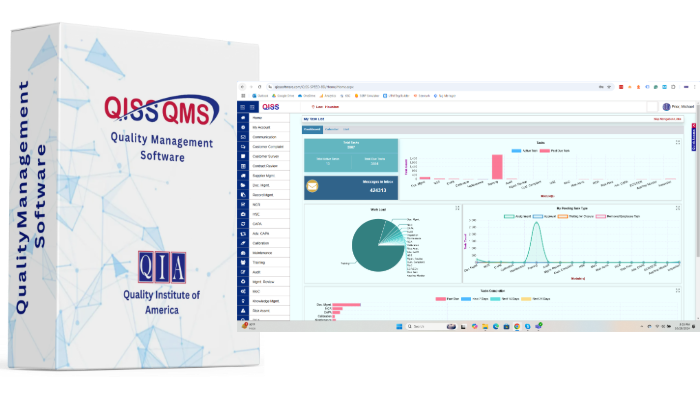

QMS Software for Small Business
Our quality control management software offers several benefits for small businesses, including affordability through lower prices and flexible subscription models. Its intuitive interface and easy setup ensure quick adoption without extensive training. The software is scalable, accommodating growth and increased complexity as businesses expand. Additionally, it enhances compliance with industry standards, reducing the risk of penalties. By maintaining high-quality standards, small businesses can also boost customer satisfaction and loyalty, ultimately improving operational success.
Frequently Asked Questions
Our software is available through several pricing tiers, depending on your desired features. We offer monthly and annual subscription plans. Please contact our sales team for specific pricing details and potential promotional offers.
Yes, we offer personalized demos of our QMS software. You can explore the interface, key features, and integration capabilities during the demo. You can schedule a demo through our website.
We prioritize data security and compliance with industry standards, including ISO and FDA regulations. Our software is designed to help you maintain compliance in regulated industries.
Yes. Our quality management system can be integrated with existing systems such as ERP systems.
No. With QISS QMS, you can manage all types of ISO compliance in one place.
Yes, QISS QMS is designed with multi-region, multi-area, and multi-location functionality. With this single software, you can efficiently manage your Quality Management System (QMS) across all your global locations while maintaining designated user permissions. Additionally, QISS QMS is a multi-program solution, enabling you to manage not only your Quality Management System but also Food Safety Management and Environmental Management Systems within the same platform.
Learning Center
Here, you will find articles related to different aspects of a Quality Management and Laboratory Management System. This is a center for gaining knowledge.





